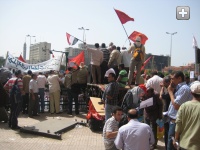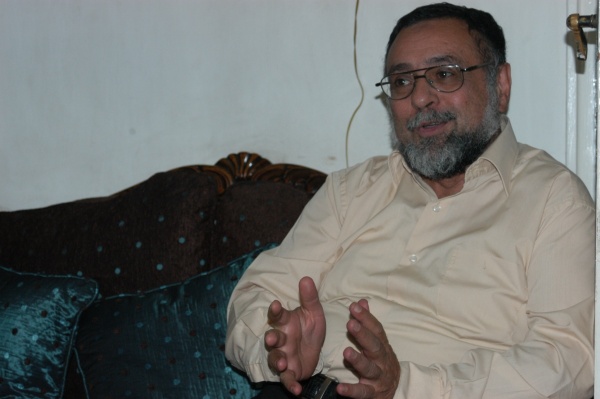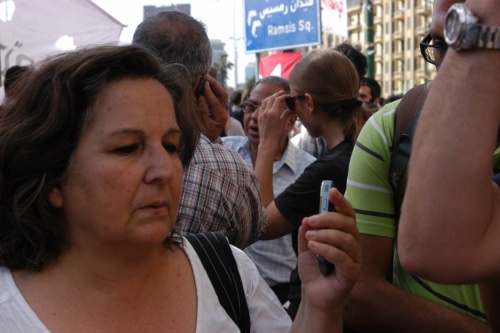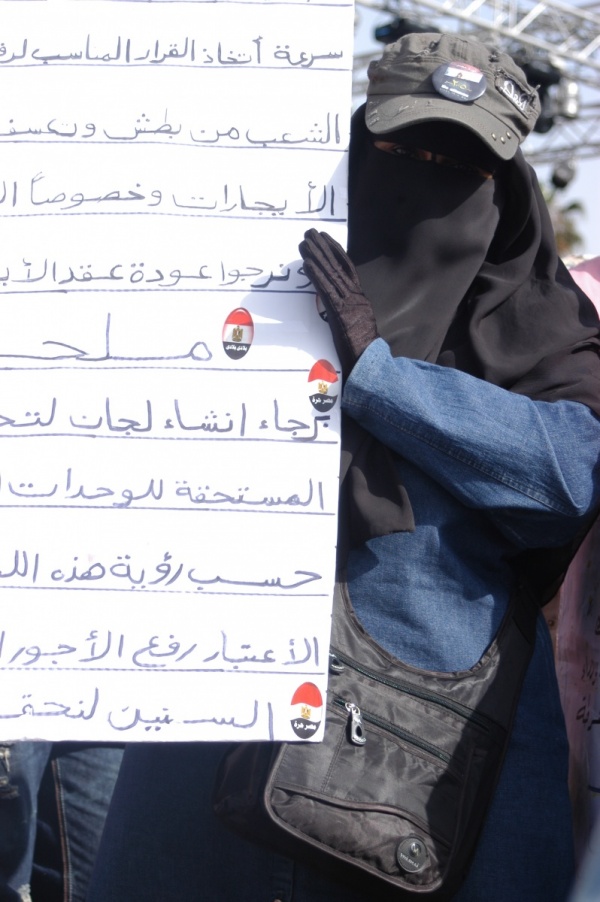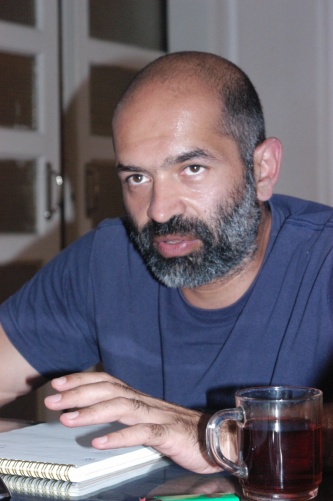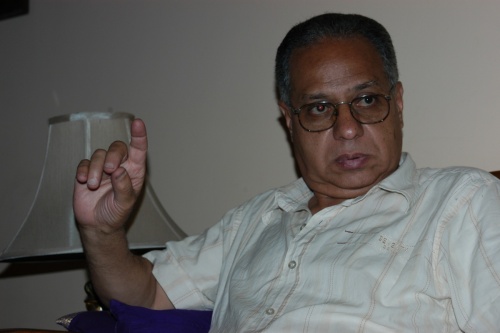What we experienced, roughly speaking, was a boiling situation and a society in turmoil. The obvious attempt of the old regime to just get rid of its head and leave things as they used to be, has failed. The popular movement is in full swing and still growing. The first new accents in foreign policy, namely to soften the embargo on Gaza and to resume ties with Tehran, indicate a clear direction.
Right after the fall of the dictator we used to speak of a bloc of the old regime which at least was able to set up the constitutional referendum of March 19. But two months later, this bloc is showing severe weaknesses and signs of disintegration. There have been some trials of former high-ranking officials, and further trials are looming. All need to embrace the “revolution”, including the army, the tycoons, the media etc. The elections are coming closer and the old regime is lacking a political formation, let alone a convincing leader who could run for presidency.
Mobinil featuring Heinz Fischer, Austrian president
For the time being, they have picked Amr Moussa, the secretary general of the Arab League and former foreign minister. But his ticket is highly insecure. Too close was his relation to the old regime, so that his campaign could implode. Meanwhile Mohamed elBaradei, who for a certain period seemed to be promoted by the west, is neither accepted by the old elites nor by the movement. There are two retired generals who announced their candidacy, but despite the good reputation of the army, the people long for a civil government.
All these troubles are symptoms of political crisis and decay of the old regime’s bloc.
Fading constitutional referendum
The referendum formally paved the way for elections. The changes in the constitution were, however, minor. The referendum abolished article 179 which curbed basic civil rights under the guise of fighting terrorism. The most important political amendment is a provision on the procedure of drafting a new constitution. The members of the constituent assembly should be chosen by the parliament due to be elected.
The real meaning of the referendum was to block the demand for a directly elected constituent assembly, as it was forced upon the old regime in Tunisia by the popular movement.
The result of the ballot (more than 70% yes votes) seemed to be a success of the old regime, stabilising the situation and curbing the momentum of the popular revolt. Under the leadership of the army, the old elites, the Muslim Brotherhood, the Salafi forces came together, foreshadowing the outlines of a new ruling bloc.
Meanwhile the left and some liberal forces argued for voting “no” in the following way:
a) First there needs to be a democratic process for a new constitution which will set the frame for elections. The elections on the base of the old, extreme presidential system is in favour of the old elites.
b) There is not enough time for the preparation of election which also will favour the old elites and their partners.
c) One of the few decrees of the military junta so far was on the formation of political parties running for elections. The threshold with regard to the formal provisions under Mubarak was even increased.
d) Gamal Abd el-Fattah, one of the leaders of the “People’s Committees”, voiced the demand for a civil provisional government to be formed, based on all political forces of the revolutionary movement, to take over from the military council. This concept is representative for the entire radical milieu.
We wanted to know in which way the Muslim Brotherhood (MB) would respond to these concepts. Asking their second-rank leaders did not yield results. They evaded clear answers, using a generic Islamic discourse of unity. When we asked Magdi Hussein of the “Islamic Worker’s Party”, he returned the answers we were expecting from the MB. Stemming from the left, his party embarked on a several decade long entrism into the MB milieu. Using the political terms of the left, he can nevertheless be considered as one of their mouthpieces. Magdi Hussein even hopes to become their unofficial candidate for presidency, as the MB so far has declared not to run.
Magdi Hussein of the "Islamic Workers Party"
“The left only fears to loose the elections, therefore they want to postpone them.” He added that the “no” de facto would prolong the military rule, while the constitutional changes provided for a quick transition to a civilian government. We assessed both points to be quite demagogic.
Much more important among the masses, the people outside the popular movement (and obviously even more demagogic) was the projection that a strange front of communists, liberals and western agents were conspiring against the Islamic character of Egypt, which was protected by the constitution. Thus the MB saved the Sharia.
Mohamed Waked, a leader of the “National Front”, a project to form a political force out of the movement which can also run for elections, however, assessed the result for the “no” as a success: “If one takes into account that they completely control the media, while we are totally lacking resources, we did quite well.”
The stabilizing effect of the referendum has been fading ever since. The movement pressed ahead and did in no way retreat. Tahrir Square remains a political laboratory where protests continue. Hundreds of thousands asked for Mubarak to be tried and for general Tantawi, the head of the military junta, to step down. According to Abdelhaleem Kandil, a journalist, leading figure of Kifaya and prominent Nasserite, the question of the constitution is not closed. The movement will not drop the demand for a genuine constituent assembly based on the popular movement.
Abdelhaleem Kandil
Failed repressive attempts
Walking the streets of Cairo these days one will find astonishing commercials hailing the revolution. Enterprises that used to be connected to Mubarak’s network embrace the revolution. Nobody except the Salafites can be openly against the revolt. Despite this general climate, the army once and again is threatening the movement, trying to impose limits. It has evacuated Tahrir Square for several times. On April 8th, a group of army officers who participated in the democratic protest rally against Tantawi were arrested, brought before military courts and sentenced to several years in prison. Their release is an important demand of the movement.
So far the junta has issued three decrees, all of them substantially anti-democratic:
a) One on thugs, which they claim is directed against the pro-Mubarak looters, but actually targets activists. Several activists were tried in military courts, while Mubarak is scheduled to be tried before a civilian court.
b) A ban on strikes. Everywhere social movements are springing up. There is an outright wave of strikes and labour protests for higher wages and better conditions. Independent unions are created. So far the state did not dare to enforce the ban.
c) A regulation for the formation of parties, which sets high hurdles also in terms of funds. In this way the popular forces are excluded from the legal and especially from the electoral field.
A situation of continued conflict is emerging where the military council for the time being is on the defensive. Partial repressive measures are and will be applied, but a full-fledged crack-down seems not possible, according to Kandil: “Never in modern history of Egypt the army moved against the people and also today the generals cannot send the army against the people. The army needs pressure from the people.”
Foreign policy turn
Egypt used to be the main pillar of US influence in the Arab world, securing Israel as enshrined in the Camp David Accords of 1978. With the end of Mubarak, this is doomed to change. As the forthcoming elections will be an important tool to select the new political elite (which before was not the case), all candidates need to respond in one way or another to popular wishes which are predominately anti-American and anti-Israeli.
The first sign was the announcement of a partial lifting of the blockade on Gaza. Obviously the military will try to move as little as possible against US and Israeli interests, but even that minor announcement (which so far was not followed by deeds) prompted angry reactions in Tel Aviv and consternation in Washington. Also here the popular movement needs to continue to exert pressure to fully lift the embargo. Actually there are nearly permanent demonstrations for the closure of the Israeli embassy in Cairo and for the cancellation of the gas treaty which sells urgently needed fuel to Israel for a price 20% below the market value. Without the pressure from below, nothing other than empty words will happen.
Related to this is the reconciliation between Fatah and Hamas, which has been blocked by Egypt. Together with the partial opening of Rafah for passenger traffic, the reconciliation became possible due to the pressure on the Egyptian regime. Also on this matter, the Zionist reaction was very angry.
As important is the declared intention of the new regime to normalise relations with Iran, the arch enemy of the US and Israel.
Reading the signs so far Egypt is moving towards a position similar to that of Turkey at least for the time being. If the movement develops strength, the journey could even lead further.
Arab Lotfi, organiser of "We are Resistance"
The Muslim Brotherhood
Most of the forces of the popular movement expect an electoral victory of the Muslim Brothers or of a political formation they promote. But the MB are playing a difficult game with several parameters. For their religious clientele they want to keep a certain distance from political office. With the referendum they signalled to the military that they are ready for some kind of a loose coalition. But at the same time they try to take credit for the democratic movement, although they had only jumped on the bandwagon when it was already a manifest power.
Eventually they launched a cunning proposal: one common list for the new Egypt where they take half of the candidates while the other forces share the rest. In this way all others get elected and represented by the grace of the MB. They also fear overexposure on an international scale which could be mitigated in this way. Although this proposal has no chance whatsoever to be accepted by the other forces of the movement, it serves the MB to counter the reproaches that they refuse to co-operate.
Actually the MB in a certain sense needs both the cooperation with the military as well as with the movement. They will coalesce with the army and the old elites to keep the popular movement in check and coalesce with the movement in order to keep the army and the elites in check. Despite the fact that they might become the strongest single force in the ballots, they are far too weak to impose themselves alone.
Their role is contradictory not only for that reason, but can be traced back in history. Under the left-leaning pro-Soviet nationalist regime of Nasser, they were co-operating with the West in the frame of the bi-polar logic. That did, however, not mean that they were open agents or puppets of imperialism. With their reference to Islam they were building a symbolic, cultural anti-imperialism. Under pro-Western Sadat they were used to weaken the left. But Mubarak later on strongly limited their possibility to move. They were reduced to a semi-legal opposition.
The movement against Mubarak was unique in the sense that the left and the Muslim Brotherhood converged on a democratic platform which actually historically carries the imprint of the left. On Tahrir Square their milieus intermingled, which had an important impact on the younger generation of MB followers. It has become difficult for the culturally conservative sections of the MB to go against democratic rights and also to be openly sectarian. Expressed in terms of mainstream politics, they have become more mainstream.
Unexpected intermingling: with the Niqab on Tahrir Square among the leftist First May rally expressing social concerns
Regarding the social question in a more strict sense however, they maintain a pro-capitalist position. They are definitely opposed to the strikes and workers’ protests, and property rights remain sacrosanct. They are composed of and led by middle class professionals such as doctors, engineers and professors, resembling a modern caste. Essentially they are representing a merchant-type capitalism opposed only to the tycoons linked to the state. This culture of defending social stratification, if it is not excessive, of assigning status to those economically successful, is deeply entrenched in the MB brand of Islam. They for example supported the repeal of Nasser’s progressive land reform under Mubarak.
Given the explosive social situation and the increasing momentum of the mobilisation, a major conflict is possible, in which the left will be positioned against the old elite, the military and the Islamic forces (obviously including the Salafis).
The Salafis as the mob of the old regime
The term Salaf means the return to the pious predecessors, e.g. the first three generations after the prophet Mohamed. In Egypt at least three types of forces claim to be Salafi. Not only the militant al-Qaeda-type Jihadists which in Europe are labelled Salafites. Also the Muslim Brothers subsume themselves under the notion Salafi. The movement, however, uses the term Salafi only for the pro-Saudi quietist forces.
Contrary to the Jihadis (see the posthumous declaration of Bin Laden in support of the democratic revolt) and the MB, the Salafis were the only force to support Mubarak until the end and to continuously oppose the democratic changes. One can imagine in which way they have isolated themselves.
But their force should not be underestimated as they maintain a milieu counting in millions. They control several TV channels, run schools and social support networks. But their real strength is sectarianism.
They were the ones to co-operate with Mubarak on the anti-Shia campaign against Iran and especially against Hezbollah, while the MB was hailing the Lebanese victory over the Israeli aggression in 2006. Now they are campaigning against the Coptic Christians, trying to derail the democratic popular movement into sectarian conflict. Also here the MB were opposed to their participation in the movement’s manifestations against the sectarian frenzy.
The pro-Saudi Salafis have lost any anti-imperialist credentials given their role as the mob of Mubarak. While the concept of militant Jihadism substituting a crazy militarism armoured with rigid sectarianism for the masses) suffered political bankruptcy, it nevertheless still has some credit for its steadfastness against imperialism.
The left
It would be both a simplification as well as an underestimation of the impact of its global post-89/91 de-composition to call the popular revolt a leftist one. Actually the organised left is very small but played a significant role. After all Kifaya (Enough), a coalition of leftist and nationalist forces, with its steady protests was preparing the ground for the massive popular outbreak. The Muslim Brotherhood only joined in from time to time, very timidly, while keeping a channel open with the Mubarak regime. Their jumping on the bandwagon in the revolt characterized the last half decade. It has been always the left that was in the frontlines.
The movement is a broad democratic awakening, giving space for many forces including liberal fringes as well as the Muslim Brotherhood. But it is also a matter of fact that the explicit, radical demands of the left are most congruent, organic to the movement. There are three main elements:
a) a constituent assembly to fully dismantle the old regime
b) anti-imperialism
c) class struggle against the capitalist oligarchy
Ad a) The constituent assembly is not an easy thing to achieve as it implies the eventual dismantlement of the old regime. While the Muslim Brotherhood cannot openly oppose such a demand, it is de facto torpedoing it by colluding with the old regime for an orderly transition under its control. First the constitutional referendum, then the parliamentary and presidential elections and then out of settled results a new constitution, excluding the popular movement. But the mass movement is pushing ahead against the military junta and is trying to foil this plan.
The elite’s last (but powerful) asset is the confessional question. This is the Achilles heel of the left, as they are split over secularism and a significant part is with the liberals against Islam (yes, in that abstract, Western-style way). The very fact that the popular movement was not an Islamic one should not detract from the paramount symbolic value of Islam that remains. Egypt was the first Arab country to come in close contact with Western culture and colonialism. One line of self-defence, of self-assertion has always been the reference to Islam with all its political shortcomings, reactionary elements and inclination to preserve current rule.
Mohamed Waked, National Front
According to our understanding this is all about accepting and even embracing the momentum of symbolic self-determination contained in the reference to Islam while insisting on the principle of the sovereignty of the popular masses. This is certainly not an easy thing to do. But it is the only possibility to rally the majority of poor people around the project of the left. Otherwise the MB’s trend will maintain is shaky alliance with the old elite and marginalise the left. Not to forget that they are always under the pressure of the Salafi currents who will have an easy game if the left does not care to respect the symbolic value of Islam.
Ad b) On anti-imperialism and anti-Zionism there is a much broader consensus, also regarding the Muslim Brotherhood. But the revolutionary left needs to see that the proclamations do not remain empty words but will be transformed into deeds.
Ad c) In the mid term range the social question will be decisive and here is also the main fault line with the MB. As the core stratum of the MB is a merchant-culturalised capitalist middle class. They are strongly opposed to class struggle despite the fact that their clientele is extending deeply into the poor masses. The MB supported the military’s decree banning strikes and they argue for economic stability and “back to business to feed the people”.
Meanwhile the socio-economic situation is dramatic and is about to become worse. Before the fall of Mubarak, Egypt was hailed as one of the best disciples of the global financial governing institutions. But even within the system, some doubts arose that the notorious trickle-down effect simply didn’t happen. Here are some random indicators which give a dire picture: inflation is at 12% and for food even at 20%. To avoid revolt, even Mubarak had to heavily subsidise food. Some 5% of the GDP is spent on fuel subsidies. About half of the population lives below the poverty line. The industrial wage level is below that of China. Half of the consumed cereals are imported. There is a severe conflict with the upstream states of the Nile on water distribution, a question of life and death in one of the most arid countries on earth.
Mubarak was strictly following neo-liberal prescriptions. Favourable conditions and low labour cost was supposed to attract foreign investment for export industries. It did work out in the sense that the small elite made formidable fortunes while the masses remained poor and the poorest become even poorer. The current labour unrest could lead to higher wages, something which under certain circumstances could induce a new cycle of capitalist growth. If Mubarak’s economic framework is maintained, it might, however, lead to the contrary.
So what is urgently needed is a socio-economic turnaround away from neo-liberalism towards something the Indian resistance movement calls “development by and for the people.” That means that it is not enough (and not even possible) to seize political power from the oligarchy without also wresting economic power. As Abdelhaleem Kandil puts it: “The next stage of the revolution will be a social one.” On this field not only major conflicts are to come, but as of yet the movement including the left has to do its very first steps.
For the time being the left is experiencing significant growth. Many new groups and formations are being built and the old ones are renewing their ranks. On May 7th, a major congress for a constituent assembly and against the military junta took place in Cairo, gathering several thousand people – numbers unthinkable before.
Gamal Abd el-Fattah, People's Committees
While Kifaya has ceased to exist (Kandil: “mission accomplished”) there are two broader projects of the revolutionary left: on one hand “People’s Committees” which are being organised in the poor and middle class quarters of the towns, incorporating several political organisations. And on the other hand there is the “National Front” (using the word “qawmi”, which is pan-Arab, and not “watani”, which would be limited to Egypt alone). It tries to form a political expression of the movement roughly based on the three points enumerated before, and with the intention to run for elections.
On the field of elections the left (let alone the revolutionary forces) might, however, appear much weaker than on the streets.
